“What is needed for peace is collaboration” – youth leaders of the Boko Haram -affected regions share their thoughts about future
Laughter and happy chatter filled the conference room of a hotel in N’Djamena, Chad, on a Monday morning in November 2022 when representatives of the Youth Network for the Lake Chad Region reconvened after a long pandemic-induced break. We interviewed four of the young leaders who participated in the meeting on how they see the role of youth in peacebuilding in the conflict-affected region of the Lake Chad Basin.
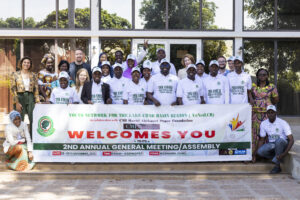
Group photo of the participants in N’Djamena, Chad. (above) Scenes from the training in N’Djamena, Chad. (below)
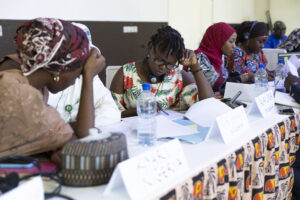
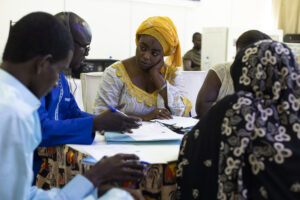
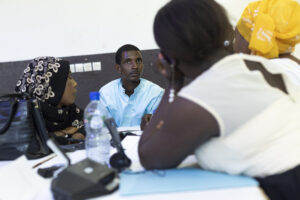
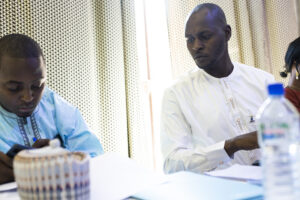
Youth Network for the Lake Chad Region
- The Youth Network for the Lake Chad Region is a platform comprised of leaders and representatives of youth groups, movements and individuals across the Lake Chad territories and states in the four surrounding countries: Nigeria, Niger, Cameroon and Chad.
- The Network was formed in a youth meeting held on the margins of the Second Lake Chad Basin Governors’ Forum in Niamey, Niger in July 2019.
- The purpose of the Network is to advance the participation of young people in the stabilization efforts in the Boko Haram -affected areas of the Lake Chad Basin. Read more here.
- CMI has supported the Network’s capacities since it was founded.
- The agenda of the Second Annual Network Meeting in November 2022 included a review of the workplan, a communications training and youth contributions to the Regional Stabilization Strategy. The meeting was jointly supported by CMI, the Lake Chad Basin Commission and the African Union.
Kauna Hamman, 33, is from Northern Nigeria. In 2018 she co-founded The Strategy for Peace and Humanitarian Development Initiative. It is an organization that envisions peaceful coexistence through communal peacebuilding, women and youth empowerment. Starting her own initiative with friends has been a healthy learning curve. Where there was will, there might not have been knowledge. Mending the gap has been an essential step.
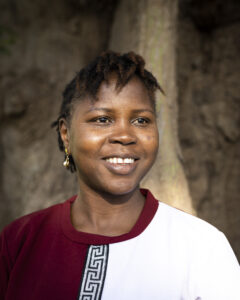
The importance of networks such as the Youth Network for the Lake Chad Region is not lost on Hamman. In her native Nigeria, youth are often not taken seriously and there are no platforms for them to develop into leadership positions.
“This network does not only welcome us but also gives us a voice. It is a great initiative that will bring out the best in the region as a whole,” thinks Hamman.
“Peace is a gradual process and it will take a lot of time because there is a lot of bitterness between people,” says Hamman. She speaks from experience, as she has seen with her own eyes what tribal violence has done in her own extended family.
“We need a change in narrative. Revenge is not the way forward, dialogue is,” thinks Hamman.
Mahamat Adam Moustapha, 33, from the Lake Chad Province, Chad, works with a youth collective called CADELAC. His mission is to concretely include youth in decision-making through advocacy.
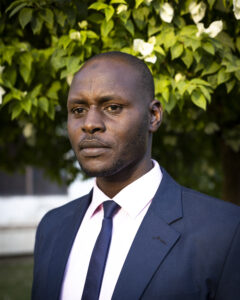
“There is a lot of talk about how it is important to include youth in activities, but that talk is not visible on the ground.”
Unemployment is a serious challenge in Chad and in the Sahel region in general. Many Sahelian youth have university degrees but do not find work. Therefore, access to employment is key and forms part of Moustapha’s organization’s objectives. CADELAC also helps to improve the CVs and motivation letters of the young job seekers.
In the Lake Chad region, unemployment is closely related to security threats. The region is very young with a median age of 18 years, and many youth do not have income-generating activities to keep them busy.
“What empowers Boko Haram in this sub-region is the vulnerability of women and youth who are easy targets to be recruited,” Moustapha says.
Violent extremism does not stop at the borders. The Boko Haram insurgents originally came to Chad from Nigeria by boat across the lake which forms the state border. Some of the teaching in Coranic schools in neighbouring Nigeria has reinforced the problem.
Although the peak of the insurgency is now behind, almost 3 million people remain displaced in the Lake Chad Basin. The threats posed by the conflict are manifold, ranging from food insecurity worsened by climate change to direct threats of violence. Some residual cells of Boko Haram militants and other bandits are for example still hiding on the small islands of Lake Chad.
“Sometimes they hide even below the water surface, with papyrus plants over their heads,” Moustapha explains.
Moustapha believes that the Chadian state’s military force is an important part of dealing with the extremist threat. Cooperation among the four Lake Chad countries is also necessary, like at the Youth Network Meeting that CMI supported in N’Djamena.
Another key issue is to inform the youth about the importance of security and peace.
“In order to build peace, firstly there is a need for raising awareness. Secondly, we need to eradicate corruption. Thirdly, conflicts need to be handled in a peaceful manner. That way we can aspire for peacebuilding,” Mahamat concludes.
Fatima Ibrahim Musa, 28, is from Borno State, Nigeria. Borno State has been deeply affected by Boko Haram ever since 2009. Attacks on schools and Musa’s university in 2014 affected her deeply and worked as a catalyst for her passion for women’s and girls’ rights. According to Musa, since the arrival of Boko Haram in Borno State, Nigeria, sexual and gender-based violence as well as domestic violence have risen significantly.
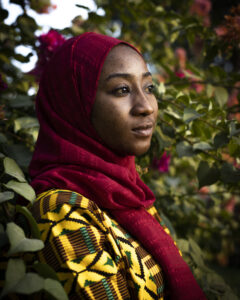
“We women really are at the receiving end of the crisis. I think we are often seen only as victims, but a lot of the solutions come from us as well,” says Musa.
Her work with the British Council now centers around gender-based violence and women´s rights, as well as peacebuilding. Projects and activities around empowering women through financial independence are vital for the future of the women.
“A lot of the violence women face is also connected to the financial dependency on men,” thinks Musa.
Peacebuilding is a new concept and a word that is unknown to people. Part of Musa’s personal efforts evolves around an initiative that she is currently developing. An initiative that aims to mend the gap between mentorship and capacity-building as well as creating awareness on peacebuilding and what that concretely means.
Musa says that the Youth Network feels personal for everyone. It has taken a lot of courage to get it to the point where it is now. Next steps from her perspective are commitment and sustainability, as well as mentorship, in order for the leaders to see that the Network is a group that deserves to be taken seriously.
“If you talk about peace, you have to talk about livelihoods, security, climate, sanitation, water. Peace is an interconnected matter. What is needed for peace is collaboration,” says Musa.
Alfa Abdel-Aziz, 32, from Cameroon works for an organization that specializes in development, peace consolidation and capacity-building of the youth through various activities and trainings. One of the aims is to train youth peace ambassadors who can go to schools and universities and create dialogue.
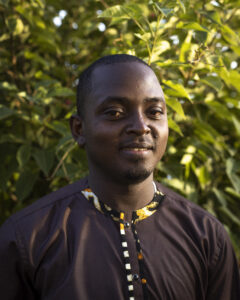
“One important part of our work is to bring old and young people together around the table for a dialogue, for a deeper intergenerational understanding,” tells Abdel-Aziz.
Abdel-Aziz reflects on the Network meeting as being essential for dialogue between the countries and for establishing common ground for the future of the Network.
For a peaceful future, Abdel-Aziz wants to enhance the understanding of conflict resolution as a part of daily life. “Conflicts are normal in the everyday life. What we need is to build understanding that conflicts can be resolved and they do not need to escalate,” says Abdel-Aziz. In the communities, conflict de-escalation is essential and a lot can be prevented by creating work for youth and supporting entrepreneurship.
“Peace is built every day” believes Abdel-Aziz.
text: Juho Takkunen & Maria Santto / CMI
photos: Maria Santto / CMI